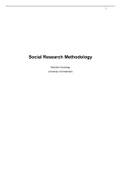1
Social Research Methodology
Bachelor Sociology
University of Amsterdam
, 2
Table of contents
Bryman's Social Research Methods
Chapter 2 – Social research strategies
Theory and research
The relationship between theory and research is not easy to describe, for two main reasons.
First, there is the question of what kind of theory we are talking about. Secondly, there is the
question of whether we collect data to test theories (a deductive approach) or to build theories
(an inductive approach).
What kind of theory?
The term "theory" is used in many different ways, but the most common meaning is that of
explanation for certain events or patterns that have been observed (often called "observed
regularities"). However, discussions of social theory usually do not address this type of theory,
focusing instead on theories with a higher level of abstraction. Examples of such theories are
structural functionalism, symbolic interactionism, critical theory, poststructuralism, structuring
theory, and so on. In classifying the types of theory into these two categories, we have
distinguished between what Merton (1967) called theories of the middle, which seek to
understand and explain a particular aspect of the social world, and major theories, which operate
at a more abstract level.
Social scientists are sometimes skeptical of research that has no clear links to theory,
and such research is often dismissed as naïve empiricism.
Deductive and inductive theory
As we have noted, researchers take different approaches to the use of theory. They can use the
theory as the basis for their research, which is known as a deductive approach, or the theory can
arise after their research, which is known as an inductive approach.
Deductive approach
In this approach, the researcher relies on what is known about a particular domain and on
relevant theoretical ideas to infer a hypothesis (or hypotheses): a speculation that he can
empirically test. The hypothesis embeds concepts that need to be translated into researchable
entities (often called variables).
The final step in this process, the revision of the theory, is a movement that goes in the
opposite direction of deduction — it involves induction, in which the researcher thinks about the
implications of his findings for the theory that underpinned the entire exercise.
Inductive approach
Here, theory is the result of research and is formed by making generalizable inferences from
observations. Just as deduction involves an element of induction, the inductive process is likely
to involve a certain degree of deduction. Once the researcher has carried out some theoretical
reflection on a set of data, he may want to collect further data to determine under what conditions
a theory does and does not hold. This is often referred to as an iterative strategy, shifting back
and forth between data and theory.
,3
, 4
Consider deduction and induction together
It is best to consider deductive and inductive strategies as tendencies, rather than fixed
distinctions. There is a third approach, abductive reasoning, which has become increasingly
popular because it is a way to address the limitations of both deductive and inductive
approaches. Abduction recognizes that the conclusions resulting from an observation are
plausible, but not entirely certain. It can also be considered an inference to the best explanation.
Epistemological considerations
We now turn to the epistemological issues associated with social inquiry, in other words, the
question of what is (or should be) considered acceptable knowledge in a discipline.
Positivism
Positivism is an epistemological position that advocates the use of scientific methods to study
social reality and beyond. The term extends beyond this principle, and different authors describe
its elements in different ways.
1. Only phenomena, and thus knowledge confirmed by the senses, can really be
considered knowledge (a principle known as phenomenalism).
2. The purpose of theory is to generate hypotheses that can be tested so that they can
assess explanations of laws - patterns and regularities - (the principle of deductivism).
3. Knowledge is obtained by collecting facts that form the basis for laws (the principle of
inductivism).
4. Science must (and presumably can) be conducted in a way that is "value-free": in other
words, that is objective.
5. There is a clear distinction between scientific statements and normative statements —
judging what is "good" or "bad" — and a real scientist is only allowed to do the former.
This last principle is implied by the former, since we cannot establish the truth or the
opposite of normative statements using the senses.
It is a fact that some writers and traditions reject the idea of studying social reality using the
principles of the natural sciences, but it is not always clear whether they criticize the application
of a general scientific approach or positivism in particular. Realism, for example, is another
philosophical position that expounds on the nature of scientific practice.
Interpretativism
Interpretativism is an epistemology that contrasts with positivism. It is based on the view that
there are fundamental differences between man and the objects of the natural sciences.
Hermeneutics and "Verstehen
One of the most important influences on interpretativism is hermeneutics. This is a term that
originates from theology and is used in the social sciences to denote the theory and method
associated with the experience of human action. At its most fundamental level, hermeneutics is
concerned with interpretation and understanding, and how history, culture, and language shape
those two important aspects of the human world (Mason and May 2019). Instead of seeing
individuals as passive vessels subject to powerful, but unseen, social forces acting on them,
hermeneutics emphasizes the situated nature of human understanding and interaction.






